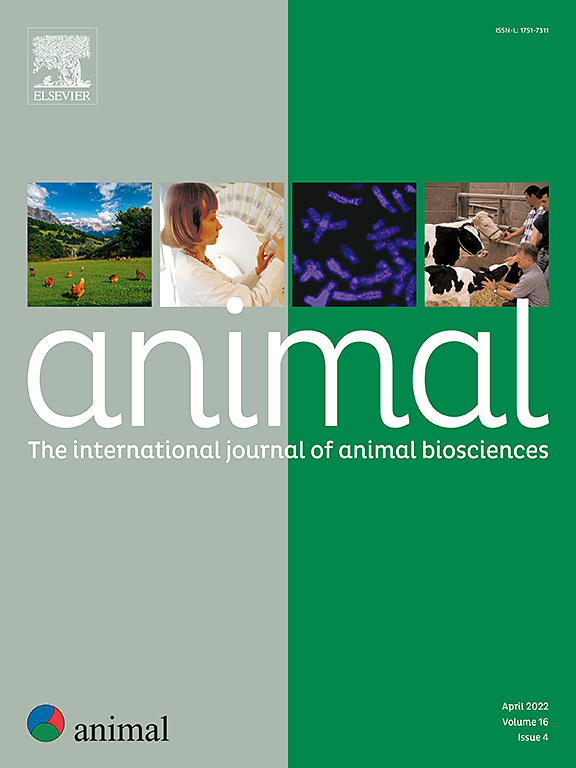Review: Micronutrient supply, developmental programming, and strategic supplementation in ruminant livestock
IF 4.2
2区 农林科学
Q1 AGRICULTURE, DAIRY & ANIMAL SCIENCE
引用次数: 0
Abstract
Developmental programming, also known as fetal programming, is the idea that changes in offspring development with both immediate and longer-term consequences can arise from in utero stress, including compromised maternal nutrition. Large animal models demonstrate that perturbed maternal nutrition, including macro- and micronutrient supply, (amino acids, vitamins, and trace elements) can alter development during gestational and postnatal offspring outcomes. Strategic supplementation of micronutrients (methionine, arginine, selenium, folate, vitamin B12, choline, cobalt, sulfur and others) also alters placental function and therefore, fetal nutrient supply. Specifically, in the offspring, multiple visceral tissues, metabolism, growth, and reproduction are impacted by compromised nutrition and these effects are potentially mitigated by strategic supplementation. Furthermore, compromised maternal nutrition and strategic supplementation alter gene expression, metabolomic patterns, and biochemical pathways in the offspring. Developmental programming is mechanistically driven, at least in part, by epigenetic mechanism and one carbon-metabolism and associated specific micronutrients. The concept of developmental programming is strongly supported by data from ruminant animal models, wherein compromised maternal nutrition is a stressor driving programming events. Changes in the offspring’s transcriptome and metabolome can be influenced by changes in maternal nutrition during development. Evidence suggests that strategic supplementation of micronutrients potentially mitigates the compromised development. Future research needs include efforts focused on: mechanistic investigations, livestock production outcomes, animal health implications, and host-microbiome interrelationships associated with maternal nutrition, developmental programming and strategic supplementation.
综述:反刍家畜微量营养素供应、发育规划和战略补充。
发育程序设计,也被称为胎儿程序设计,是指子宫内的压力,包括母体营养受损,可能导致后代发育的变化,造成短期和长期的后果。大型动物模型表明,母体营养紊乱,包括宏量营养素和微量营养素供应(氨基酸、维生素和微量元素),可改变妊娠期和产后后代的发育结果。微量营养素(蛋氨酸、精氨酸、硒、叶酸、维生素B12、胆碱、钴、硫等)的战略性补充也会改变胎盘功能,从而改变胎儿的营养供应。具体来说,在后代中,多种内脏组织、代谢、生长和繁殖受到营养受损的影响,这些影响可能通过战略性补充得到缓解。此外,母体营养受损和有策略的补充会改变后代的基因表达、代谢组学模式和生化途径。发育规划是由机制驱动的,至少部分是由表观遗传机制和碳代谢以及相关的特定微量营养素驱动的。反刍动物模型的数据有力地支持了发育规划的概念,其中母体营养受损是驱动规划事件的压力源。后代转录组和代谢组的变化可能受到发育过程中母体营养变化的影响。有证据表明,有策略地补充微量营养素有可能减轻发育受损的情况。未来的研究需要包括:机制调查、牲畜生产结果、动物健康影响、与母体营养、发育规划和战略补充相关的宿主-微生物组相互关系。
本文章由计算机程序翻译,如有差异,请以英文原文为准。
求助全文
约1分钟内获得全文
求助全文
来源期刊

Animal
农林科学-奶制品与动物科学
CiteScore
7.50
自引率
2.80%
发文量
246
审稿时长
3 months
期刊介绍:
Editorial board
animal attracts the best research in animal biology and animal systems from across the spectrum of the agricultural, biomedical, and environmental sciences. It is the central element in an exciting collaboration between the British Society of Animal Science (BSAS), Institut National de la Recherche Agronomique (INRA) and the European Federation of Animal Science (EAAP) and represents a merging of three scientific journals: Animal Science; Animal Research; Reproduction, Nutrition, Development. animal publishes original cutting-edge research, ''hot'' topics and horizon-scanning reviews on animal-related aspects of the life sciences at the molecular, cellular, organ, whole animal and production system levels. The main subject areas include: breeding and genetics; nutrition; physiology and functional biology of systems; behaviour, health and welfare; farming systems, environmental impact and climate change; product quality, human health and well-being. Animal models and papers dealing with the integration of research between these topics and their impact on the environment and people are particularly welcome.
 求助内容:
求助内容: 应助结果提醒方式:
应助结果提醒方式:


